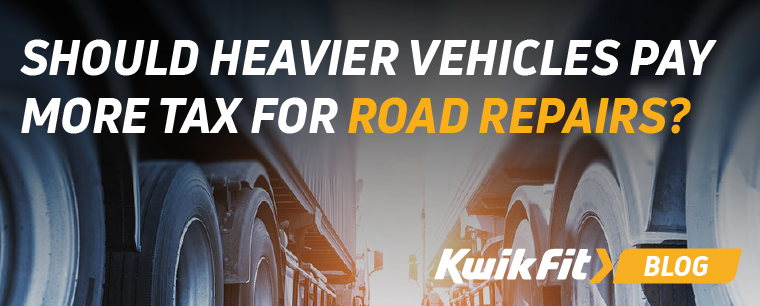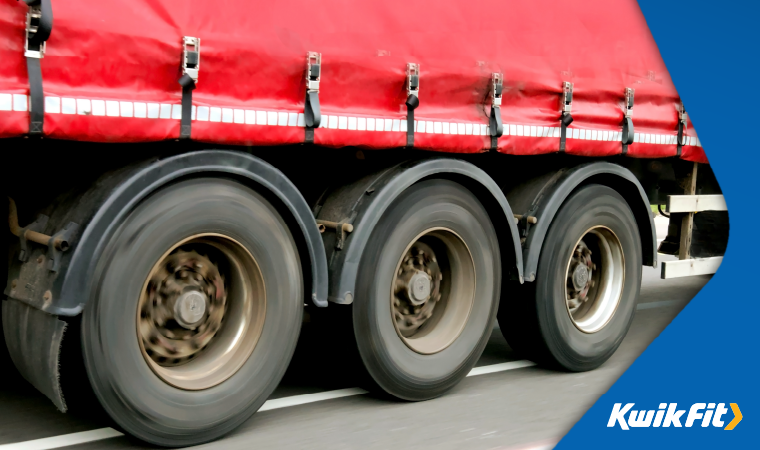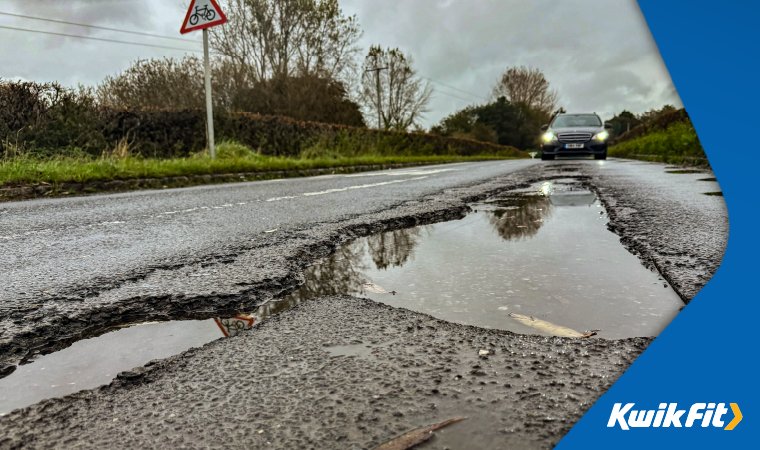Should Heavier Vehicles Pay More Tax For Road Repairs?
Kwik Fit | Tuesday 17th June 2025 9:00am

The state of the UK’s roads is often the topic of conversation. Let’s face it, we’re a bit of a pothole-mad nation.
As it stands, pothole damage costs are on the rise and, even though there’s been a recent boost in road repair funding, most drivers don’t expect smooth road surfaces any time soon. In fact, many think it’s only fair that the vehicles doing the most heavy lifting — like lorries and delivery vans — should chip in a bit more when it comes to covering the costs of repairing the UK’s roads.
This idea of a ‘pothole levy’ is gaining traction, and millions of drivers are hoping it could be just the thing to help fund essential repairs and make roads safer for all. But would heavier vehicles paying more road tax be enough to remedy the UK’s roads? Read on to find out what the experts think.
How is road tax currently calculated?
Road tax or ‘Vehicle Excise Duty’ (VED) has to be paid by almost all motorists (with few exceptions). Currently, petrol, diesel, electric, and hybrid car owners all have to pay a certain amount based on the age of their vehicle and its CO2 emissions.
As expected, newer vehicles with lower emissions are required to pay a lower rate than their older ICE (petrol and diesel) counterparts. To simplify things further, the annual fee you’ll have to pay for road tax in the UK is currently based on:
- When your car was first registered
- How much CO2 your car emits
- What kind of fuel your car uses (petrol, diesel, electric, hybrid, etc)
Should heavier vehicles pay more VED?
In the face of rising pothole costs and the condition of Britain’s road surfaces, many drivers are calling for heavier vehicles to shoulder more of the burden when it comes to funding repairs.
Kwik Fit’s Pothole Impact Tracker keeps record of the annual cost of damage to the nation’s vehicles from pothole impact, as well as driver attitudes towards potholes. In our latest research, we found that the majority of drivers think operators of heavy goods vehicles should make a bigger contribution to repairs.
HGVs and road tax
Our research found that 56% of drivers say that HGV operators should pay an additional levy, which is ringfenced for road surface repairs. In contrast, just 17% disagree.
The argument for HGVs paying more is clear: lorries and tankers weigh more and therefore cause more harm to road surfaces than the average road user. Due to their significant weight, these vehicles apply greater pressure to road surfaces, causing cracks and weak spots that can develop into potholes and unevenness at a greater rate than wear from regular cars.
What about delivery vans?
Our research also found that drivers believe that there should be an additional ring-fenced levy placed on delivery vans, too. Of the drivers we asked, 44% were in favour of such a measure, compared to just 23% who were against it.
Like HGVs, delivery vans are much heavier than regular cars and exert a repeated stress on the road surface, weakening it and causing cracks to form. When water enters these cracks and freezes during cold temperatures, they can expand and form potholes - which worsen over time.

The heavier the vehicle, the heavier the tax?
Given the impact of weight on road surfaces, then, should the law be changed? Our survey revealed that a greater proportion believe that the weight of a car should be a factor in setting ‘road tax’. Nearly half (48%) of drivers told our researchers that the owners of heavier cars should pay a higher rate of road tax to reflect their greater impact on the roads, with just one in five (21%) against.
What do the experts think?
While it’s tempting to demand an ‘even-ing of the playing field’ when it comes to road tax, alterations to VED rates cannot be considered in isolation. HGVs and delivery vans, not to mention heavier cars like taxis, may well raise the prices of their products and services if they incur higher rates of tax, redirecting the cost to the consumer.
As Dan Joyce, operations director at Kwik Fit, says: “Of course, any costs placed on businesses through levies on HGVs or delivery vans are likely to be passed through to the end consumer, so it’s critical that potential measures are not looked at in isolation. And, however the required funding is raised, what is vital is for there to be a long-term strategic plan for road maintenance rather than short-term patching.”
Will the government take action?
Have you ever driven a car abroad and noticed that the roads felt different? Maybe even better? This is a common experience for Brits abroad, and we can’t help but wonder how our nation’s roads would fare if pitted against other countries’.
On that note, 77% of the drivers we spoke to said that the number of potholes on UK roads is an embarrassment for one of the world’s leading economies. But does the government have any plans to improve things?
As of April 2025, local councils across England will receive a share of a £1.6 billion highway maintenance fund to help with remedying potholes across the country. However, many drivers remain sceptical of the difference this will make. Despite the additional funding from the government, 64% of drivers say they don’t expect to see an improvement in the condition of roads in their local area in the near future.

How much are potholes currently costing the UK?
This year’s ALARM Report from the Asphalt Industry Alliance revealed that local authorities estimate that it would take £16.8bn to tackle the backlog of road repairs. This figure has increased 42% since 2016, while over the same period, Kwik Fit’s tracker has shown that the cost to drivers has risen by 150%.
Our Pothole Impact Tracker also revealed that, over the last year, the country’s drivers paid £1.7bn to repair vehicle damage caused by potholes.
Read more about the latest pothole damage costs.
Would you be prepared to pay more road tax?
Would you pay slightly more road tax if it meant smoother road surfaces? Our research indicates that most motorists feel they are already personally paying enough to support the country’s road maintenance programme. In contrast to a levy on HGVs or vans, only a quarter (26%) of drivers would be prepared to pay more ‘road tax’, which would be ringfenced for road repairs in their local area.
However, there are differences between generations on this point. Interestingly, younger drivers would be much more willing to pay more tax to fix roads than older drivers. Two-fifths of Gen Z (40%) and Millennials (38%) would be prepared to pay an additional local road tax, compared to just 18% of Generation X and 15% of Boomers.
On this, Dan Joyce observed: “The data shows that there is an increasingly pressing need to invest in the maintenance of our road network, but our new research highlights that there are no easy answers as to how this is funded.
Motorists already feel that they are contributing enough, so it is understandable that they want the additional burden to be on the heavier vehicles believed to do the most damage to road surfaces.”
We’ll have to wait and see what comes of the “pothole levy” in the coming months.
Hit a bump in the road?
If you’ve hit a pothole and damaged your vehicle — from a flat tyre to damaged wheels — bring your car in to your local Kwik Fit and our team of expert technicians can help diagnose and solve the issue.
With over 600 centres across the UK, you’re never far from a Kwik Fit. Why not keep your car in the best condition possible with our free tyre checks and free vehicle safety checks too?
In the meantime, keep up with the latest motoring news and receive expert driving advice on the Kwik Fit blog.
Any facts, figures and prices shown in our blog articles are correct at time of publication.
Featured Articles
Is it Illegal to Drive With One Headlight?
Saturday 19th July 2025
Wondering if it’s illegal to drive with one headlight? Learn about the safety risks and penalties of illegal blown bulbs and why you should fix them promptly.
Air Con in EVs & Hybrids: Experts Answer Your Questions
Monday 30th June 2025
Does air con drain EV batteries? Can you use the air con while charging an electric car? Find out the answers to these questions & more from Kwik Fit’s experts.
Why Is Your Car Making a Noise? Fixes & Tips
Friday 13th June 2025
When your car starts making unexpected noises, it can certainly be quite disconcerting; it may be nothing to worry about, but here’s what you need to know.









